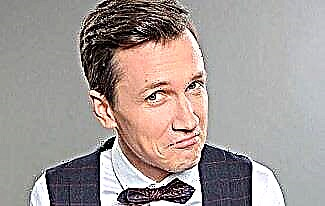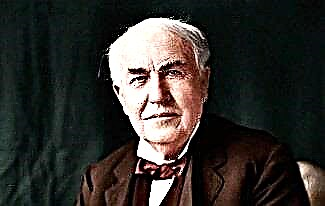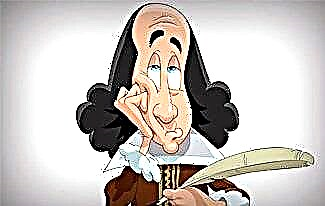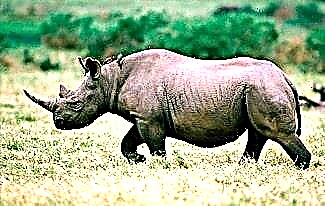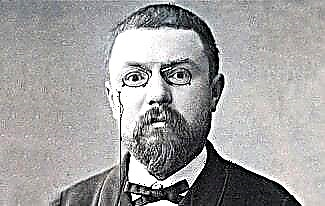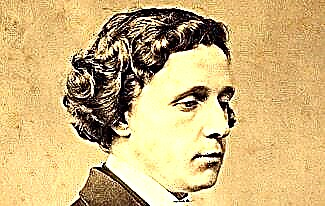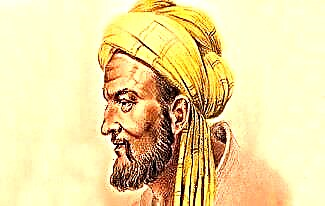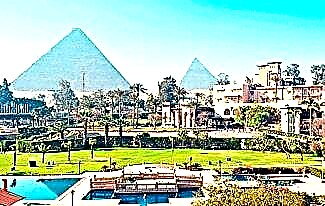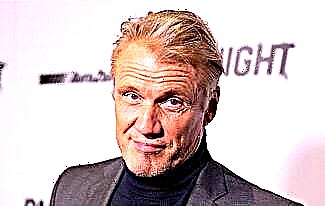There is a well-known expression in the Russian language, or rather, a verbal screen: "contradictory personality." For example, Leo Tolstoy is a great writer, humanist and philosopher. At the same time, the count did not miss a single peasant skirt. Grudging girls how much in vain - that's the reason to declare him a "contradictory personality". That is, there seems to be a reason to call a person dishonest, but other merits outweigh this dishonesty. And Peter the Great was christened contradictory, and Ivan the Terrible, and Joseph Stalin. In general, if conscience does not allow directly to be called an enemy and a tyrant, the definition of “contradictory personality” is used.
The situation with the first Russian President Boris Nikolayevich Yeltsin (1931 - 2007) is even more complicated. Everyone admits that he is a very controversial person. One problem is that there is very little positive among Yeltsin's contradictions. On the other hand, Yeltsin is firmly inscribed in the current political paradigm. Throw Boris Nikolayevich out of the building of modern Russian politics - it turns out that all the pillars of modern Russian industry are people who managed to get unprecedented preferences from the ever-half-drunk president. The same applies to most politicians and artists. Shout "And the king is naked!" Only a few were able to, and even then some of them, like Alexander Korzhakov, took revenge on Yeltsin for disgrace.

Most likely, we will never know what drove Yeltsin in the historical era of 1987-1993. Only in the 21st century did the country begin to gradually recover from the consequences of the rule of its first president. Here are some facts from the biography of Boris N. Yeltsin, illustrating his movement to power and behavior on the political Olympus.
1. Boris Yeltsin's father was a harsh man, if not cruel. His arsenal of punishments included not only whipping with a belt, but also standing in a blown-out corner of the barrack throughout the night. However, the severity of punishments helped little to the cause of education.
2. Boris studied well, but he received a certificate of completion of the seven-year period only through the district department of education. At the certificate ceremony, he began to criticize one of the teachers, for which he was taken away from the certificate he had just handed.
3. Yeltsin's father served time for anti-Soviet agitation, but Boris, filling out hundreds of questionnaires, managed to never mention it. Where the inspectors looked remains a secret and gives rise to very bad suspicions. Moreover, there were “enemies of the people” not only in Yeltsin's genealogy.
4. While studying in Sverdlovsk, Yeltsin devoted a lot of time to sports, but at the same time did not ask for any concessions in his studies.

5. During the work on the distribution, the future chief builder of the USSR received certificates of a driver, bricklayer, tower crane operator, etc., in a total of 12 specialties. He was accustomed to apply himself to the glass in parallel with obtaining blue-collar occupations.
6. Yeltsin's wife Naina was actually named Anastasia. This was recorded both in the birth certificate and in the passport. However, her father immediately began to call her Naya, and gradually everyone got used to the name Naina. The spouse of the future president changed her passport data only in the 1960s.
7. After the birth of his first daughter, Yeltsin was terribly upset, and his wife directly told the doctors in the hospital that her husband would not let him go home. After the birth of his second daughter, Yeltsin said: "I will not give birth again!"

Yeltsin and daughters
8. Working as director of a house-building plant, Yeltsin appeared at home very rarely. It got to the point that when the family went to a restaurant to celebrate the award, the neighbors in the house in which the Yeltsins received an apartment congratulated Naina on the fact that she had managed to find a husband and father for her daughters.
9. Both of Yeltsin's daughters have children from their first marriages (Elena's daughter and Tatyana's son), “recorded” already on their second husbands. The names of Sergei Fefelov (Elena's first husband) and Vilen Khairullin (Tatyana's first passion) have been deleted from the family chronicle.
10. The first house, which was built under the leadership of Yeltsin the foreman, stands in Yekaterinburg today. Its address is Griboyedov Street, 22.
11. When Yeltsin was already working as director of a house-building plant, a five-story house built by Yeltsin's DSK collapsed in Sverdlovsk. A severe punishment followed - instead of the promised Order of Lenin, Yeltsin received the Order of the Badge of Honor.
12. Yeltsin was protected by the first secretary of the Sverdlovsk regional committee of the KPS Yakov Ryabov. Having dragged Yeltsin to the post of first secretary of the city committee of the CPSU, Ryabov himself was forced to fight Yeltsin's rudeness and rudeness, but it was too late.

Yakov Ryabov
13. Becoming the first secretary of the regional committee, Yeltsin gained unprecedented popularity for those years, hosting a weekly live television program dedicated to the fight against disadvantages. Viewers could make calls directly on the air, and the first secretary on the spot solved problems over the phone.
14. Under Yeltsin, a subway, several theaters, the Youth Palace, the House of Political Education and a number of other public buildings appeared in Sverdlovsk. It was in Sverdlovsk that the first MHKs appeared - youth housing complexes, built by the hands of future residents in their free time from work. Now it may seem wild, but in those years it was one of the most realistic ways to quickly get an apartment.

Sverdlovsk. Youth Palace
15. By order of Yeltsin, the Ipatiev house was demolished, in the basement of which the royal family and servants were shot. Formally, Borin Nikolayevich carried out the decision of the Politburo of the Central Committee of the CPSU, but it was adopted in 1975 and the then first secretary Yakov Krotov found an opportunity not to carry it out. Yeltsin, apparently, having found the paper with the decision, demolished the famous mansion in 1977.
16. In 1985, Yeltsin began the conquest of Moscow, first becoming the head of the construction department of the Central Committee, and then the secretary of the Central Committee. It was actively promoted by Vladimir Dolgikh, Yegor Ligachev and Mikhail Gorbachev himself. Subsequently, they all suffered greatly from Yeltsin's rancor. And in December Yeltsin became the first secretary of the Moscow City Committee. An impressive career climb rate - three positions in 8 months.
17. Under Yeltsin, 1,500 stores were opened in Moscow, food fairs appeared for the first time, and City Day (1987) was celebrated.
18. The fall of Yeltsin, which actually turned out to be a take-off, began on October 21, 1987. He spoke at the Plenum of the Central Committee of the CPSU, after which they began to slowly push him into the shadows, for a start, removing him from the post of head of the Moscow City Committee. However, these "repressions" turned Yeltsin into a national hero.
19. One of the interviews given by Yeltsin “in disgrace” was reprinted in 140 Soviet newspapers and magazines.
20. In the first elections of People's Deputies of the USSR, Boris Yeltsin received more than 90% of the votes in the Moscow electoral district # 1. Since politics in Russia has always been and is being done in the capitals, after such a result of the main oppositionist M. Gorbachev and his comrades, it was already possible to pack up and move from the Kremlin. But the agony continued for another year and a half.
21. The Yeltsin family first received and then privatized a state dacha in the village of Gorki-10. Maxim Gorky once lived in this dacha.
22. September 9, 1987 Boris Nikolaevich either fell on scissors or attempted suicide. And on September 28, 1989, there was a story with the alleged abduction of Yeltsin and throwing him off the bridge in a sack. After two decades, such adventures look ridiculous and childish, but in the late 1980s, the whole country was worried about Yeltsin. “The intrigues of the Kremlin and the KGB,” the opinion was almost unanimous.
23. At the end of May 1990, after three attempts to vote, Yeltsin was elected head of the Supreme Soviet of the RSFSR. Two weeks later, the Declaration of State Sovereignty of Russia was adopted, and the Soviet Union finally went downhill.

The post of Chairman of the Supreme Soviet of the RSFSR was just a springboard
24. Yeltsin became the President of Russia exactly one year after the adoption of the Declaration of Independence - on June 12, 1991. He received over 57% of the vote. A year later, the number of those who supported Yeltsin dropped by 2.5 times - Gaidar reforms began.
25. During the so-called coup in 1991, Yeltsin's chief bodyguard, Alexander Korzhakov, insistently suggested that his ward hide from the all-powerful KGB and special forces in the American embassy. However, Yeltsin showed courage and flatly refused to leave the White House. Now we know that the GKChP's intentions were not bloodthirsty, but in those days there were tanks on the streets of Moscow.

26. When Boris Yeltsin was recording on television the famous decree No. 1400, which allowed him to forcefully disperse the Supreme Soviet, a teleprompter went out of order in the studio. Yeltsin was not embarrassed by this. Technical difficulties, as he will write later, helped him calm down.
27. On 22 September 1993, the Russian Constitutional Court, by 9 votes to 4, declared Decree No. 1400 unconstitutional, and its signing as an action sufficient to remove Yeltsin from the presidency. Since the publication of this decision, all of Yeltsin's actions were formally illegal. Nevertheless, the parliament was shot, and after that Yeltsin's power became almost absolute.

28. “Operation Zakat” is not a dodgy move by Russian intelligence. So the head of Yeltsin's security, Alexander Korzhakov, and his subordinates called actions to dilute vodka with water and then restore the integrity of the cork on the bottle intended for Yeltsin. The President was amazed that modern vodka is better drunk than Soviet.
29. On June 30, 1995, after Shamil Basayev and his gang seized a hospital in Budyonnovsk, Boris Yeltsin resigned from the presidency at a meeting of the Security Council. Companions persuaded him to stay in office.
30. It is believed that in 1994-1996, Yeltsin suffered five heart attacks in a short time, turning into a wreck by the 1996 elections. However, the former chairman of the Council of Ministers of the USSR Nikolai Ryzhkov claimed that two heart attacks happened to Yeltsin in Sverdlovsk.
31. Yeltsin's victory in the second round of the 1996 elections was ensured by the insane media lies. Yevgeny Kiselyov on NTV provided filming of the staged meetings of Yeltsin with workers, peasants, youth and other segments of the population. And at one of the real meetings (in Krasnodar), Yeltsin was offered to resign. Also, apparently remembering his triumphant experiences of communicating with the crowd, Boris Nikolayevich loudly asked who agreed with such a proposal. The answer was monosyllabic: "Everything!" But thanks to the media, injections of money to oligarchs and falsifications, Yeltsin won 53.8% of the vote.

Yeltsin read the re-oath of the President of Russia with great difficulty
32. After winning the elections in 1996, Yeltsin practically did not lead the country. In rare moments of relief from ailments with a heart, he demonstrated the symptoms of Alzheimer's disease that put everyone into a stupor: either he gave the Japanese prime minister the Kuril Islands, then he pawed Swedish maids of honor, then he wooed Boris Nemtsov a princess, then he dug potatoes with the whole family.
33. During his rule, Yeltsin dismissed 5 prime ministers, 45 deputy prime ministers and 145 ministers.
34. Upon resigning on December 31, 1999, Yeltsin did not say a word about his health problems, justifying his resignation by the accumulated problems in politics. He did not say the replicated phrase “I'm tired, I'm leaving” in his New Year's TV address.

35. Boris Yeltsin died after 12 days of stay in the Central Clinical Hospital from progressive cardiovascular failure, which provoked multiple organ failure, on April 23, 2007. The first president of Russia was buried at the Novodevichy cemetery. A monument was erected in his honor in Yekaterinburg and a huge museum was opened, the so-called Yeltsin Center.

